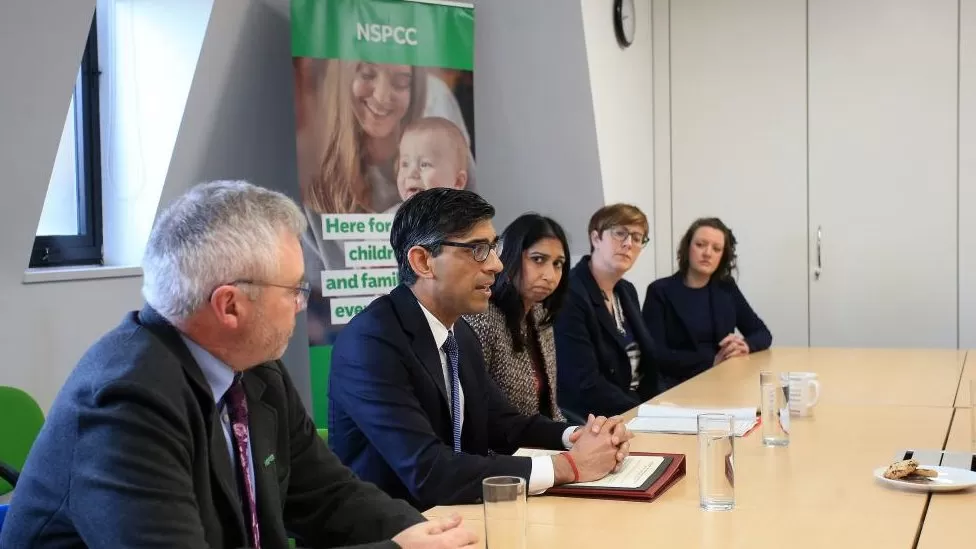
Specialist officers will be sent to help local forces with their investigations, the government said.
It said better ethnicity data will help ensure abusers do not evade justice due to “cultural sensitivities”.
Labour said it called for expanded police specialist teams nearly a decade ago but the government “failed to act”.
The prime minister said: “For too long, political correctness has stopped us from weeding out vile criminals who prey on children and young women.
“We will stop at nothing to stamp out these dangerous gangs.”
Better data on the make up of grooming gangs, including ethnicity, would also be used to help ensure suspects “cannot hide behind cultural sensitivities as a way to evade justice”, the government said.
But Sabah Kaiser, ethnic minority ambassador to the Independent Inquiry into Child Sexual Abuse (IICSA), said it was “very, very dangerous” to turn child sexual abuse “into a matter of colour”.
She told BBC Radio 4’s Today Programme: “Child sexual abuse does not have a skin colour, it doesn’t have a religion, it doesn’t have a culture. Child sexual abuse does not discriminate.”
The government may be accused of deploying police resources without having a full understanding of the scale of the problem.
Last year a report by the inquiry found the police and councils still do not understand the risk of organised gangs grooming children in their areas and are not collecting data which would help identify paedophiles and their ethnic background.
It found that, in some cases, authorities might be potentially downplaying the scale of abuse, and that local authorities “don’t want to be labelled another Rochdale or Rotherham” – referring to the high-profile grooming gangs cases.
Signs of abuse were found in six areas studied by the inquiry, but police forces generally could not provide evidence about the extent of the problem.
Over years of hearings and research IICSA also found child abuse existed in a wide range of contexts, ranging from religious institutions, schools, the care system, and online, which are not covered by Monday’s announcement.
There is also a huge backlog in cases going through the courts, which particularly affects victims of child abuse who sometimes have to wait years, while dealing with the trauma their experience has createdPrime Minister Rishi Sunak and Home Secretary Suella Braverman at the NSPCC offices in Leeds
Sir Peter Wanless, chief executive of the NSPCC, said it was “really important that by raising an issue such as race we don’t create other blind spots”.
He told BBC Breakfast: “Because for sure there are many, many predators, who prey on vulnerable children, who are from a range of cultural backgrounds.
“And there are many victims, who are not white girls, who deserve our attention and support.
“So my plea would be is that we are blind to nothing as we address issues of child sexual abuse.”
Plans also include introducing legislation to make membership of a grooming gang an aggravating factor during sentencing, Downing Street said.
The prime minister was in Leeds and Greater Manchester on Monday meeting victims and local police to mark the launch of the taskforce, which will be supported by the National Crime Agency.
It comes after the government said people who work with children in England will be legally required to report child sexual abuse or face prosecution, under its plans.
The move – which is subject to a consultation – was recommended last year by IICSA.
Home Secretary Suella Braverman told the BBC that while the fault lay with the perpetrators for “carrying out heinous and vile acts of depravity”, there was also “a wilful turning of the blind eye” among authorities.
She said that in towns around the country, “vulnerable white girls living in troubled circumstances have been abused, drugged, raped, and exploited” by networks of gangs of rapists, which she claimed were “overwhelmingly” made up of British-Pakistani males.
Ms Braverman added that “cultural sensitivities” and concerns about “being called bigoted” had played a role in high-profile abuse scandals including in Rochdale and Rotherham.
An independent inquiry found at least 1,400 children had been subjected to sexual abuse in Rotherham between 1997 and 2013, with the perpetrators predominantly men of Pakistani heritage.
Home Office-commissioned research in 2020 found “a number” of high-profile cases had “mainly involved men of Pakistani ethnicity”, but also highlighted “significant limitations to what can be said about links between ethnicity and this form of offending”.
It said there was limited research on offender identity and poor quality data, which made it difficult to draw conclusions, however “it is likely that no one community or culture is uniquely predisposed to offending”.
Dr Ella Cockbain, associate professor at University College London’s Department of Security and Crime Science, said the government was “disregarding and contradicting” its own research.
The Labour Mayor of West Yorkshire, Tracy Brabin, called Ms Braverman’s comments a “dog whistle” – meaning a coded message designed to appeal to a certain group.
Shadow home secretary Yvette Cooper told the BBC the government’s plans were “far too inadequate for the scale of the problem” and accused ministers of “chasing headlines”.
She appeared to back the collection of ethnicity data, saying widespread data collection should be happening, but went on to say: “The government has to show some proper leadership and the Home Office hasn’t been showing that leadership”.
The Liberal Democrats’ home affairs spokesperson Alistair Carmichael said they supported steps to crack down on those responsible, but said: “Unless the government tackles the backlog in our courts and restores community policing, too many criminals will continue to evade justice.”






